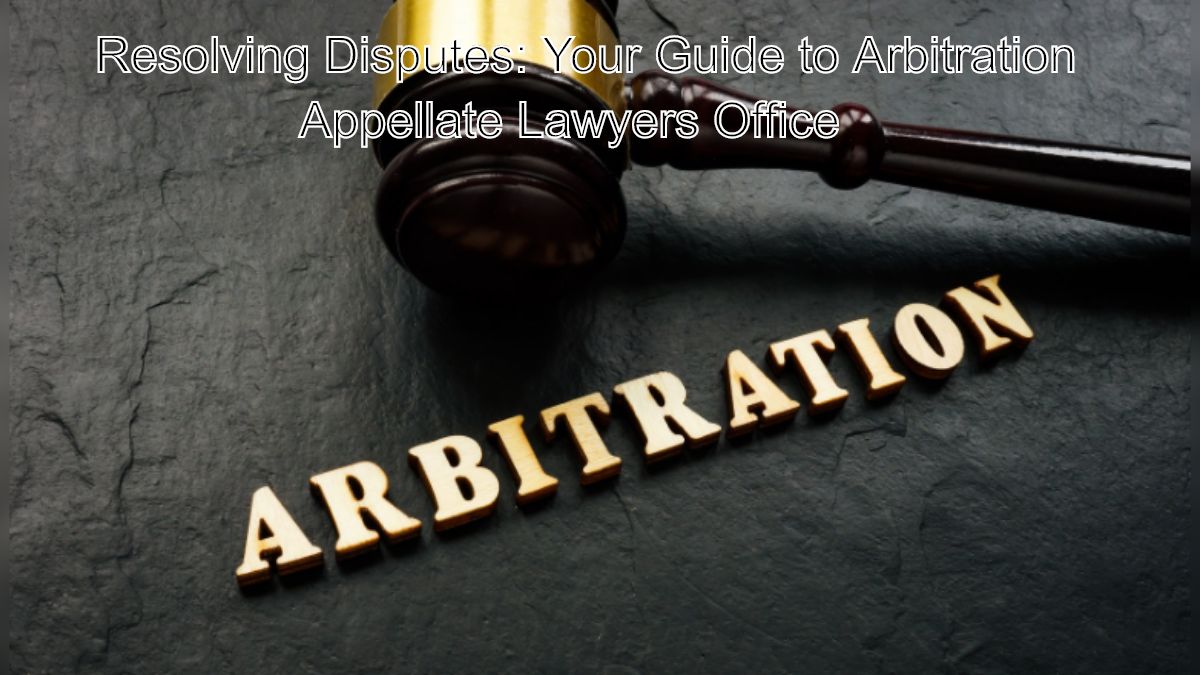Resolving Disputes: Your Guide to Arbitration: Disputes are an inevitable part of life, and whether they arise in business dealings, contracts, or even personal relationships, finding a swift and effective resolution is crucial. Fortunately, there are alternatives to lengthy and expensive court battles. Arbitration stands as a viable option, offering a more streamlined and potentially less adversarial approach to settling disagreements.
Resolving Disputes: Your Guide to Arbitration: Appellate Lawyers Office
What is Arbitration?
In simpler terms, arbitration is a method of dispute resolution outside the traditional court system. Parties involved in a disagreement appoint a neutral third party, known as an arbitrator, to hear arguments and make a binding decision. This decision, similar to a court judgment, is enforceable by law.
Why Choose Arbitration?
There are several compelling reasons to consider arbitration over litigation:
- Cost-Effectiveness: Arbitration fees are typically lower than court costs associated with filing fees, lawyer retainers, and lengthy trials.
- Confidentiality: Arbitration proceedings are generally confidential, unlike public court hearings. This can be particularly advantageous for businesses seeking to protect sensitive information.
- Efficiency: Arbitration tends to be faster than litigation. Cases are streamlined, with less focus on procedural hurdles, leading to quicker resolutions.
- Flexibility: Parties have greater control over the arbitration process. They can tailor procedures, choose an arbitrator with relevant expertise, and even select a location convenient for all parties involved.
- Focus on Settlement: Arbitration often encourages a more collaborative approach. The arbitrator can facilitate discussions and explore settlement options, potentially leading to a mutually agreeable solution.
How Does Arbitration Work?
The arbitration process typically involves these steps:
- Initiation: One party files a demand for arbitration, outlining the dispute and seeking relief.
- Selection of Arbitrator: Parties may agree on an arbitrator or follow procedures outlined in the arbitration agreement to appoint a neutral third party.
- Pre-Hearing: The arbitrator establishes ground rules for the proceedings, including timelines for document exchange and witness testimonies.
- Hearing: During the hearing, each party presents their case, including evidence and arguments, similar to a court trial.
- Decision: Following the hearing, the arbitrator issues a binding decision, outlining the resolution and any remedies awarded.
Benefits of Arbitration with Appellate Lawyers Office
The Appellate Lawyers Office possesses extensive experience in guiding clients through the intricacies of arbitration. We offer the following advantages:
- Skilled Representation: Our team of seasoned attorneys will advocate for your best interests throughout the arbitration process.
- Strategic Guidance: We will carefully analyze your case and develop a comprehensive strategy to maximize your chances of a favorable outcome.
- Expertise in Negotiation: Our lawyers are adept at negotiation, working towards reaching a settlement that aligns with your goals whenever possible.
- Efficiency and Cost-Effectiveness: We strive to resolve your dispute efficiently and cost-effectively, keeping you informed throughout the process.
FAQs: Arbitration with Appellate Lawyers Office
Q: Is arbitration binding?
A: Yes, arbitration decisions are generally binding and enforceable in court.
Q: Can I appeal an arbitration decision?
A: The scope for appeal in arbitration is typically limited compared to court cases. Our lawyers will advise you on the appeal process specific to your arbitration agreement.
Q: How long does arbitration take?
A: Arbitration is generally faster than litigation, often resolving within a few months.
Q: What are the costs involved in arbitration?
A: The costs associated with arbitration can vary depending on the complexity of the case and the arbitrator’s fees. We will provide a clear breakdown of potential costs upfront.
Conclusion
Arbitration presents a compelling option for resolving disputes in a swift, cost-effective, and potentially less adversarial manner. The Appellate Lawyers Office stands ready to guide you through the process, ensuring your interests are protected and advocating for a favorable outcome. Contact us today to schedule a consultation and discuss how arbitration can help you achieve a successful resolution to your dispute.
Read More
- Appellate Lawyers Office: Best Legal Firm in Chennai 24×7
- Advocate: How to Choose Lawyers and Attorneys?
- ARMED FORCES TRIBUNAL: Avail the Best legal Advice
- Land Dispute: Expert Senior Attorneys in Tamil nadu
- Land Litigation Lawyers: A guide and Legal Advice in Chennai
- Ministry of Law & Justice https://lawmin.gov.in/

